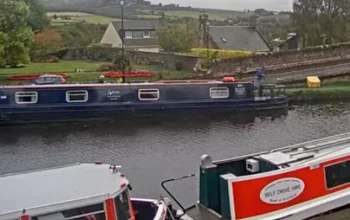PORTADOWN: WHERE THE RIVER BANN CARRIES STORIES AND STEAM
Small-town Northern Ireland with a big heartbeat, where tradition hums louder than traffic and every pint has a story.
First Impressions Along the Bann
There’s a certain rhythm to Portadown that sneaks up on you. It’s not loud or showy, but steady—like the River Bann sliding under the old Craigavon Bridge, brown and slow, carrying the reflection of church spires and passing clouds. Locals don’t rush here; they stroll, chat, wave. Even the pigeons seem unhurried.
On a cool morning, the air smells faintly of toast and diesel, drifting from cafés and delivery vans on High Street. Shops open one by one—family-run butchers, bakeries with sweet trays of Fifteens and soda farls, and the odd charity shop filled with tweed and stories. There’s a warmth in the routine, the kind you feel in towns that know who they are.
The Market House and the Heart of Town
Walk toward the river, and you’ll pass the people who make Portadown what it is—folks who actually look you in the eye. Someone will ask where you’re from before you even reach the Market House. Built in the early 1800s, it still stands proud, its red-brick façade watching generations pass. These days it hosts community events, art shows, and the occasional ceilidh that shakes the floors with laughter and fiddles.
If you listen closely, you can hear more than chatter. There’s history layered in the air—about linen mills that once powered the town’s fortune, about the railway that tied Portadown to Belfast and beyond. Old-timers might tell you how trains once left thick clouds of steam over the station, how the town buzzed with factory whistles and market crowds. Those echoes haven’t vanished; they’ve softened into something gentler.
A Taste of Local Life
By lunchtime, McAtamney’s or the Bannville Hotel might tempt you in with the smell of roast beef and Yorkshire pudding. Or you could grab a seat at one of the newer spots, like a riverside café serving strong coffee and traybakes so sweet they almost hum with sugar. Locals linger here, trading stories about football matches, weather, or the best fishing spots upriver.
The Bann itself is a living pulse. Walk its banks and you’ll see anglers casting lines, ducks cutting through the ripples, and kids racing bikes along the path. At sunset, the water turns to bronze, and the whole town seems to slow down just to watch.
Beyond the Center
If you wander farther out, you’ll find Drumcree Church, quiet among the fields—a place heavy with history and reflection. Yet around every corner, there’s also laughter. Portadown’s pubs, like The Corner House or Bennetts, fill with music on weekends. Fiddles, guitars, maybe even a bodhrán—it’s not about polished performance, but about joining in. By your second pint of Guinness, you’ll feel like part of the tune.
Portadown doesn’t beg for attention. It offers it, gently, like a friend telling you, “Stay a while—there’s more to see.” And when you finally do leave, the sound that stays with you isn’t the traffic or the train—it’s the low, steady hum of a town that still remembers how to breathe.


